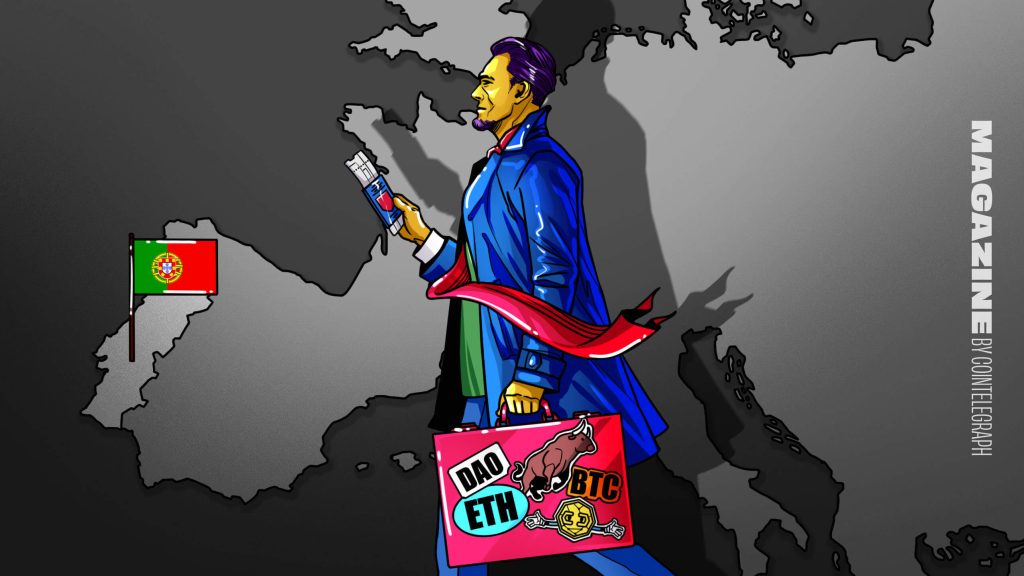|
|
New York-based pre-seed crypto venture firm manager Catrina Wang missed her flight home from a conference in Portugal back in 2022 — and ended up loving the country so much she has since moved there permanently.
Forced to find a hotel at the last minute, her stay in the beautiful forested area of Sintra made the Canadian-born Wang rethink living in the United States.

“I was like ‘Wow, I’m coming back’ and I bought a place at the end of 2023,” she says. Wang now lives in beachfront Cascais on the outskirts of Lisbon.
A general partner at Portal Ventures which manages $120 million in assets across two crypto funds, Wang says there’s a growing expat community of crypto founders and VCs, many of whom shoot the breeze in a group chat she curates.
“There’s been almost a mini exodus of crypto people. A lot of fund managers and successful founders [went] from New York to Lisbon, that’s been a consistent trend, especially this year.”
Apart from world-beating crypto taxation — capital gains tax is zero percent after 12 months, and coin-to-coin trades don’t need to be recorded — it’s almost as quick to fly to Lisbon from New York as it is to go to LA.
Portugal is attracting crypto people from all over the world, thanks to digital nomad-friendly laws, a special tax rate for highly skilled immigrants, and of course, great weather, beaches and food.
“I just really think it’s the best of multiple worlds when it comes to tax, lifestyle, value, and then it’s just a bit of balance to your crypto life. From a psychological standpoint, I moved there because it’s just the vibe. It is so laid back and chill.”

How did Portugal become a crypto hub?
According to Hugo Volz Oliveira, the co-founder and secretary of Portugal-based crypto think tank New Economy, crypto folk have been attracted to the country for years due to its lifestyle and crypto-friendly taxation.
But he says the floodgates opened during the pandemic with big inflows of crypto folk “around 2020 to 2022.”
Bernado Saraiva, co-founder of global talent mobility platform World Talents, says the company conducted research into crypto workers moving to Portugal.
“Especially after the start of the Ukraine-Russia conflict, most of the people coming from crypto to Portugal were from Ukraine and Russia, but we also see [people] from Germany, Spain and the UK — quite a lot of crypto founders relocating to Portugal.”
In fact, surveys suggest that about 20% of the crypto community in Portugal are founders, twice the number that are devs.
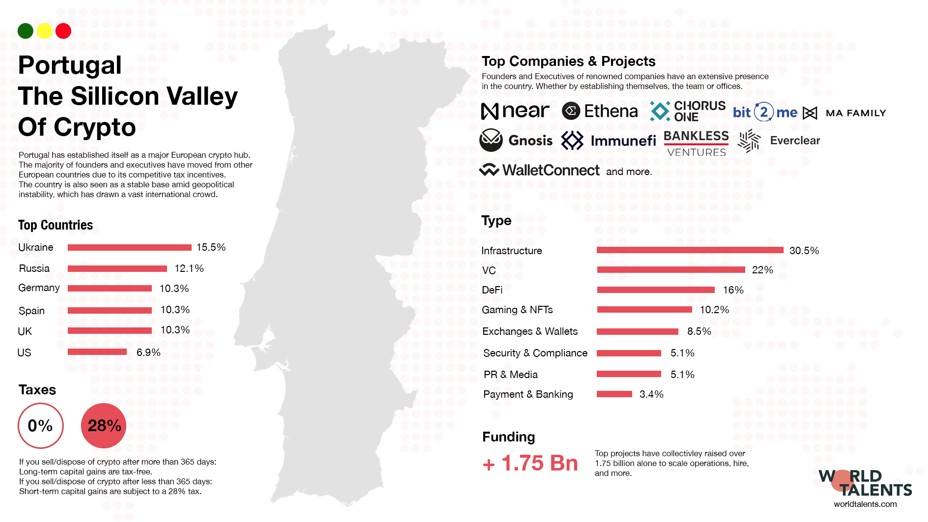
Two of the most high-profile residents are Ethena founder Guy Young and Immunefi founder Mitchell Amador. Key members of Near, Bankless Ventures, Gnosis, Peak Ventures, Z-Prime and other crypto projects also live in the southern European nation. Crypto VC Lightshift Capital is based in Lisbon.
Crypto projects have collectively raised $1.75 billion to scale their operations in Portugal. World Talents research shows the top sectors are infrastructure (30.5%), VC (22%), DeFi (16%) and gaming and NFTs (10.2%)
All told, Oliveira estimates there are between 10,000 to 100,000 people working in crypto in Portugal, although he adds that getting more precise data is a high priority.
Also read: Become a Bali crypto digital nomad like me — Here’s how
How do crypto taxes work in Portugal?
Oliveira says Portugal’s 2022 crypto tax regime is “one of the most competitive crypto tax regimes for personal income tax purposes around the world.” Hodlers pay 0% capital gains tax for assets held more than a year, and 28% CGT for short-term trades.
Even better, crypto-to-crypto transactions are also exempt. “It really reduces the compliance burden for individuals because it de facto means that you only need to declare and report when you cash out to fiat through an off ramp.”
What is the lifestyle like in Portugal?
One of the big appeals is the laid back lifestyle, which is “the perfect complement” to the fast-paced, high-stress nature of the crypto industry.
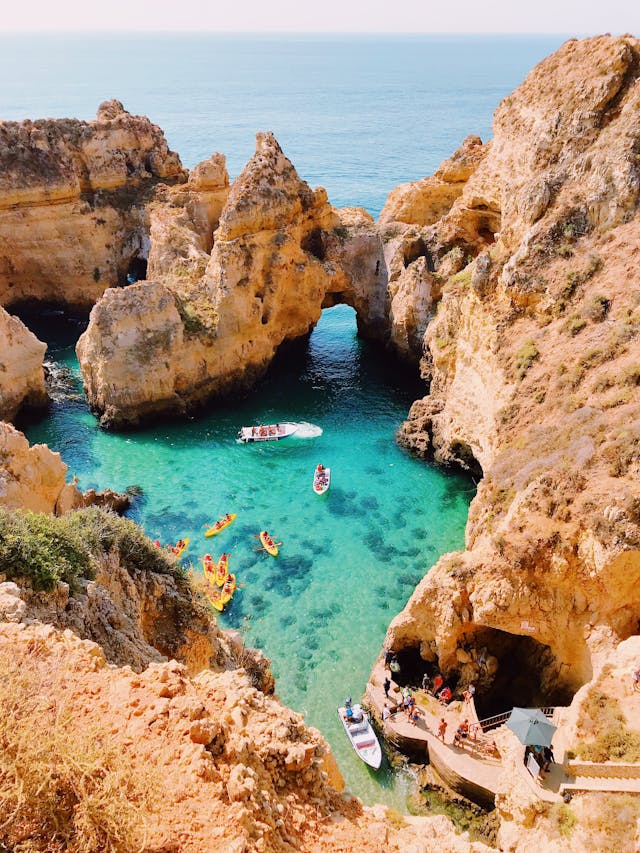
“People don’t optimize for money. It’s not a materialistic capitalism like New York,” Wang says. Her socialising in Portugal includes things like “you hike together, you go to the beach, you take weekend trips to Porto.”
One side benefit of Portugal’s modest population of 10 million is that almost everybody speaks English as a sort of universal language. Wang says it’s also the ideal base for exploring the rest of Europe — though you can only spend 90 out of each 180-day period in other Schengen zone countries before heading back to Portugal.
Saraiva notes the country is located far from any trouble. “It’s a stable European country, a little bit far from all the issues that we’ve been seeing worldwide recently,” he says.
Anyone working in crypto will likely find the cost of living is very affordable. “It is so much cheaper, especially when you come from New York,” says Wang.
And the locals are very friendly.
“Portuguese people are so nice. I mean, they’re not the most productive,” she laughs. “They’re all genuine and they’ll try their best to help you.”
What are some of the problems for the crypto and tech industries in Portugal?
Not everything is sunshine and roses in Portugal. In late April, the whole of the country lost power for 12 hours in a blackout that critics claimed was tied to the rollout of renewable energy.
And like many other European countries, the machinery of government works at a glacial pace. Despite digital transformation efforts, Oliveira says people are often frustrated by “a lot of bureaucracy” and things seem to move in a “particularly slow” way.

Wang agrees there’s a perception that Portuguese people can be a little too laid back.
“No one complains about the weather, the food, or the people to an extent. I think people complain about the productivity of Portuguese workers. It’s just a very laid-back style. So if I want to renovate my kitchen, that construction will probably take forever.”
A new site called “Portugal Story” was recently established so that people who “love Portugal” can share their “Kafka-esque” experiences with businesses, government services and even restaurants.
The billionaire CEO of Cloudflare, Matthew Prince, let his frustrations with Portugal’s “stifling bureaucracy” boil over on X, posting this week that the issue has become “significantly worse” since Cloudflare started investing in the country.
“If the trend continues, we’ll stop investing. And if you’re considering it as a tech firm, you’d be crazy to, without some hard reassurances from the government,” he said, citing problems with the immigration process and the international airport.
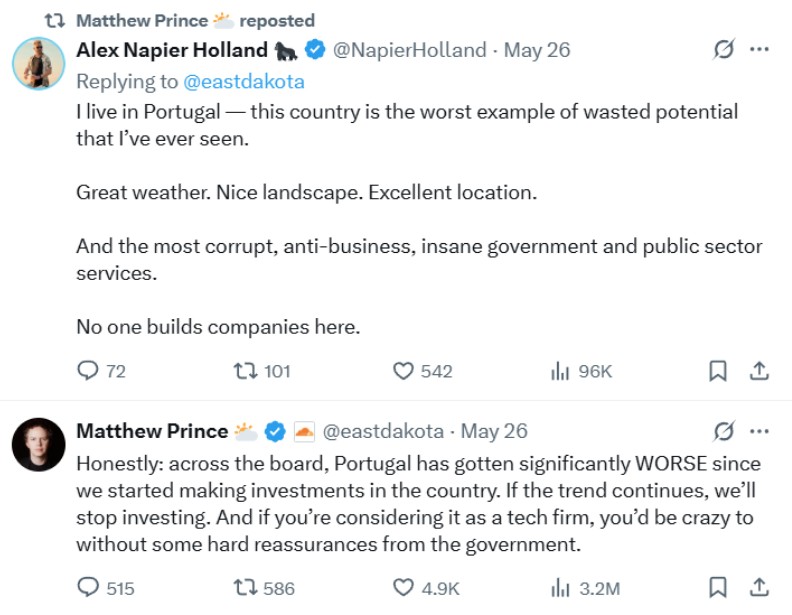
One notable example of tardiness is the country’s failure to legislate the EU’s Markets in Crypto-Assets regulation, with Portugal “one of the three last countries in Europe to adopt it,” according to Oliveira. MiCA aims to harmonize regulations across the continent, while allowing different territories to compete on tax policies, education and other incentives.
Also read: Thailand’s crypto islands — Working in paradise, Part 1
While he says there are some “minor constitutional considerations, namely about possible sanctions” that need to be resolved, it also didn’t help that the previous government collapsed in March and new elections have just been held on May 18. Until the new government adopts MiCA, new crypto businesses that require licenses will be unable to launch. But Oliveira says he is hopeful to see movement to adopt MiCA “after summer.”
With competition for crypto workers from Dubai, Singapore and the US, Oliveira says there is a growing awareness in Portugal of the need to “accelerate or else it’s going to fade.”
What visas are available for crypto workers and founders in Portugal?
There are two main visas for crypto folks.
The Golden Visa offers residency to foreigners who invest 500,000 euro in the country — and you can even invest that money into crypto via the Unbound Fund, managed by Portugal’s first regulated crypto fund, 3Comma Capital.
Some Golden Visa applicants, however, have reported long delays, including Arthur-0x, the founder of DeFiance Capital, who said he applied in 2022 and invested 500,000 euros and still hasn’t received approval.
“I consider myself to be scammed by the Portugal government at this point.”
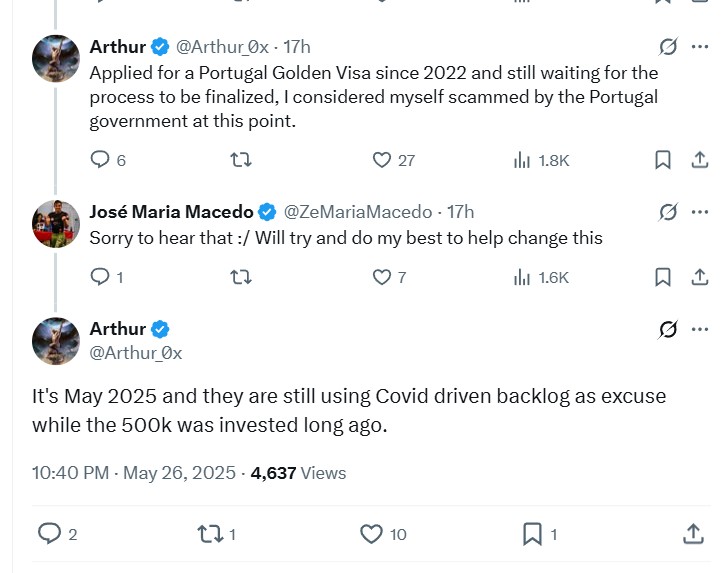
But why spend half a million euros when you can get most of the same benefits, including permanent residency after five years, for a few hundred euros with the Digital Nomad Visa?
Even Wang, who heads up a crypto fund worth billions, has opted for the digital nomad visa. “It’s pretty painless,” she says of the application process.

To qualify, crypto-digital nomads need to earn around $4,000 a month (3,480 euros) and have savings of 12 times the Portuguese minimum wage (about $12,000 or 10,440 euros), or more if you are bringing a partner and/or kids. You also need to take out health insurance and travel insurance.
Another option is the Global Talent Portugal Program, which provides fast-track residency to highly skilled professionals.
“We want to attract top executives and highly skilled individuals across the world to come to Portugal and contribute within the local ecosystem,” explains Saraiva, who helped set up the scheme. “So we have partnerships with local universities, tech parks and incubators where basically we do a match of the potential candidates abroad and we match them with the local project,” he says.
World Talents and similar providers will match crypto workers and founders with employment or investment opportunities and help guide them through the application process and the logistical challenges of moving.
But of course, you can also just do it yourself.
What is the Non Habitual Residency program in Portugal?
The Non Habitual Residency program used to provide a 20% flat tax rate for 10 years to people who spent as little as a week in the country each year. Crypto founders flitting around the globe for conferences and opportunities loved it, says Wang.
It’s since been overhauled as IFICI, which provides the same tax benefits but requires holders to spend half the year in Portugal.
“It’s definitely an incentive to move to Portugal, focusing on folks that bring high qualifications… and strong technical skills to the country,” Oliveira says.
“The impact of even the previous NHR regime has been very noticeable because it’s clear to say that most of the Portuguese crypto ecosystem success story is due to two fiscal policies,” he says, referring to the NHR and its crypto tax policies.
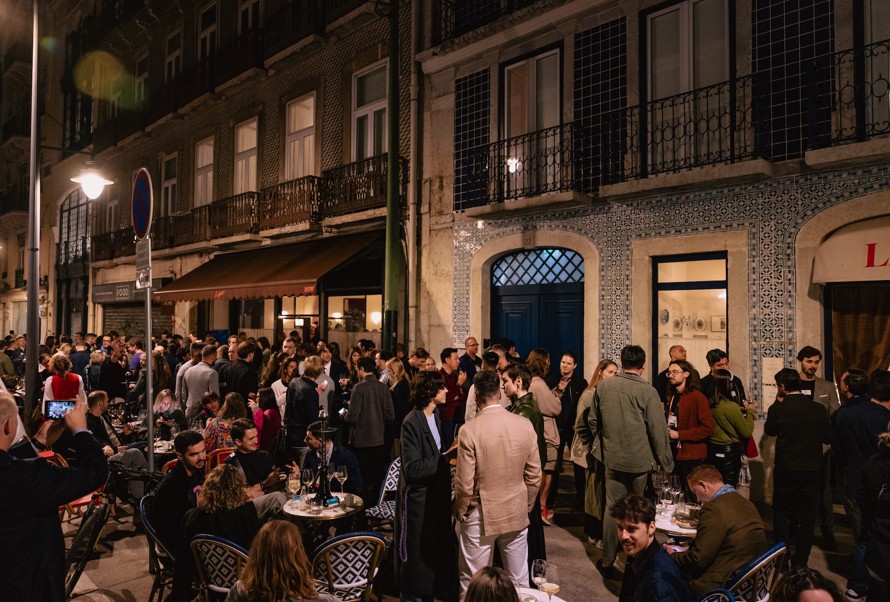
Where is the crypto industry located in Portugal?
The first crypto businesses started popping up around Braga in 2014, connected to the university there. But during the pandemic, the industry really took off in Lisbon. “Our data shows that 61% of the ecosystem, so nearly two-thirds, lives in the greater Lisbon area,” Oliveira says.
Braga and Porto are located close to each other in the north of the country, so their crypto ecosystems are quite connected. Between them, they account for more than 15% of the industry.
“The ‘other’ ecosystem we call The North,” he explains.
Ericeira on the coast attracts crypto folk who love to surf, and there are some crypto folk working in the Algarve too.
No matter where crypto nomads choose to live in Portugal, the local industry is keen to welcome them. Saraiva says that World Talents believes that attracting more crypto founders and skilled professionals to the country is good for everyone.
“Crypto being a super innovative industry, we are definitely starting to understand that and have started to want to be more involved in that space and hopefully start to contribute to it,” he says. “And bringing more talented people in the crypto industry to Portugal, because I think long term, it will be very beneficial for us and for Portugal itself as well.”

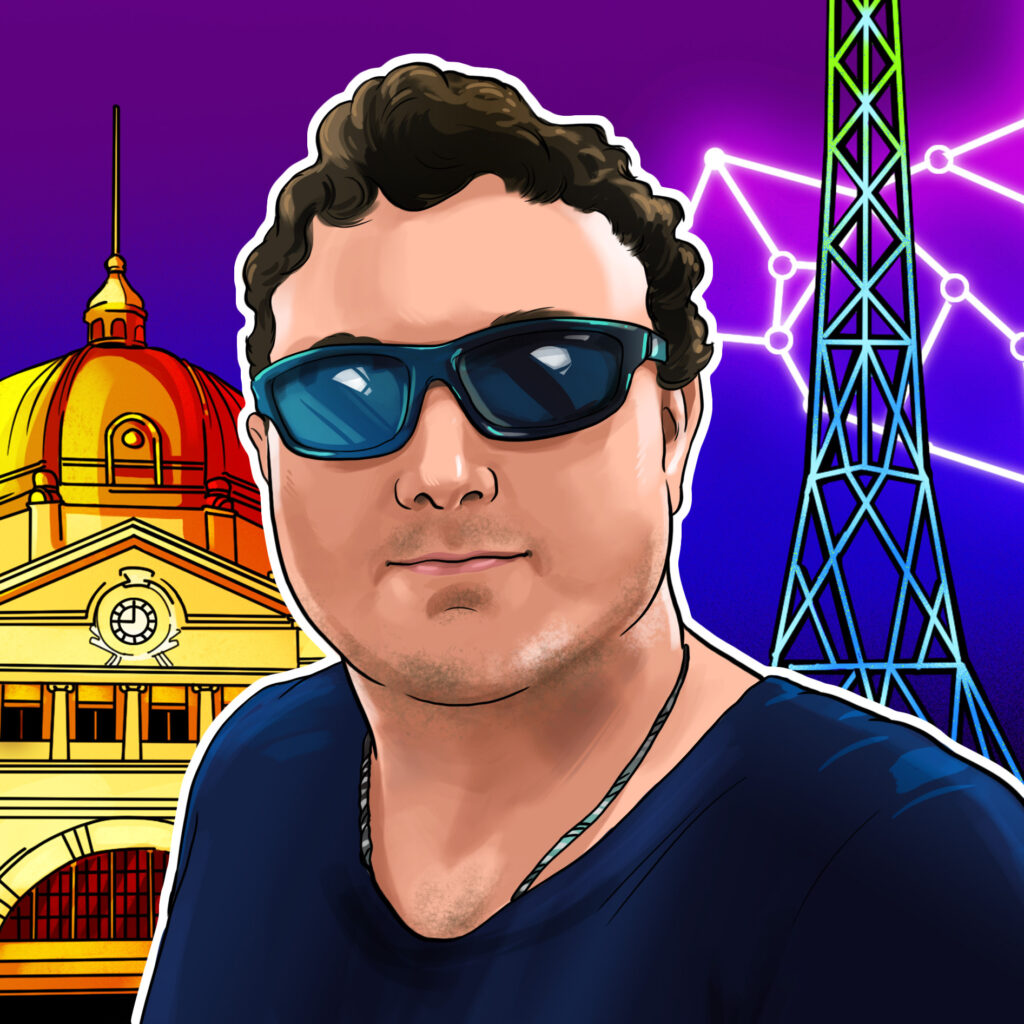
Andrew Fenton
IronClaw rivals OpenClaw, Olas launches bots for Polymarket — AI Eye
